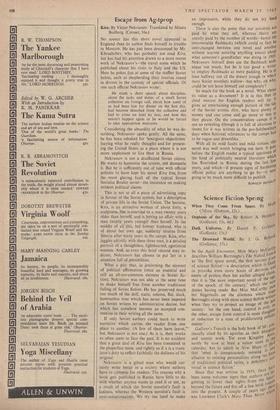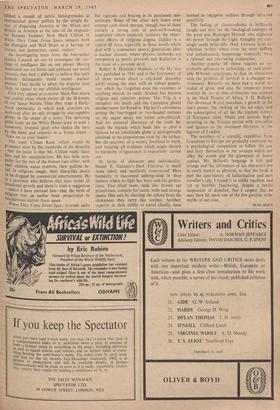Science Fiction Spring
When They Come From
Orphans of the Sky. By Robert A. Heinlein'
(Gollancz, 13s, 6d.) Dark Universe. By (Gollancz, 15s.) The Drowned World.
(Gollancz, 15s.)
IN the April Encounter, Miss Mary McCarth,,Y describes William Burroughs's The Naked Carrie as 'the first space novel, the first serious 1)eci" of science fiction'—a description which is hke'Yd to provoke even more hoots of derision an snorts of protest. than her earlier alleged claitm that it is 'the most important novel of the 3ge„; of the epoch, of the century,' which she r1„,5 denies having made. But Miss McCarthy P's her fingernails on the dilemma which 0.31'6 Burroughs along with most science fiction Write',E when they try to project an image of the jtpri society: 'on the one hand, control is evil'w°er the other, escape from control is mass siattg,ar or reduction to a state of proliferating ce' matter.' Gulliver's Travels is the holy book of SF, cc).r10; tinually cited by its apostles as their blaer,,:i5, and source work. Yet even Kingsley ftlific surely by now at least a minor saint in gell calendar, has to admit in New Maps 01 anY lines 'what is conspicuously missing is ,,s allusion to existing personalities along the `Ini, of traditional political satire, a deficiencY versal i Sincenscience fiction. that was wrtten in 1959, there 113:ec been some welcome signs that authors are tore ginning to lower their sights from the rids beyond the future and fire off a few brisk rouliero into the present. A couple of years ago thica was Laurence Clark's More Than Moon w" lobbed a couple of satiric hand-grenades at international power politics by the simple de- vice of disguising America as the Moon and Britain as America at the time of the disgrace- ful Panama Incident. Now Mark Clifton in When They Come From Space subjects both the Pentagon and Wall Street to a barrage of clumsy, but destructive, comic rockets.
An investigating team from the Interstellar Galaxy Council set out to investigate the stir- rings of intelligent life on our planet. Having monitored our art forms and analysed our social customs, they find it difficult to believe that such juvenile delinquents could master nuclear physics. They decide to adopt the disguise most likely to appeal to our childish intelligence. First they appear as a sinister black fleet above our capital cities which resists all the H-bombs of our Space Navies. Then they stage a Holly- wood spectacular in which dark scimitars are destroyed after an epic struggle by star-sapphire globes in the shape of a cross. The surviving globe lands on the White House lawn to emit a handsome, bronzed giant who shakes the hero by the hand and requests in a Texan drawl— `Take me to your leader.' The super Citizen Kane villain would be grotesque even by the standards of the Kremlin —but the 'point is that Mr. Clifton really hates him and his manipulations. He has little sym- pathy for the rest of the human race either, with their childish status symbols, their gullible be- lief in religious magic, their sheep-like desire to be drugged by commercial entertainment. He is a pessimist who believes that man resists all emotional growth and there is even a suggestion unless I have misread him—that the birth of religion was an earlier hoax perpetrated by mischievous visitors from space.
When They Come From Space is crude satire
but vigorous and bracing in its passionate mis- anthropy. None of the other new issues even attempt such shock therapy, though two of them contain a strong vein of anti-myth-making scepticism which implicitly criticises the obsur- antist effects of religious dogma. Galileo is a typical SF hero, especially in those novels which deal with a community several generations after a nuclear disaster, where physics textbooks are interpreted as poetic proverbs and Radiation is the name of a personal devil.
Robert A. Heinlein's Orphans of the Sky was first published in 1941 and is the forerunner of all those novels about a city-sized spaceship adrift among the stars with an inbred popula- tion which has forgotten even the existence of anything outside its walls. Science has become religion and scientists priests. The Trip is a metaphor for death and the Centaurus planet another name for Paradise. The hero's adventures among the four-legged or two-headed mutants on the upper decks are rather schoolboyish. And his eventual discovery of the truth be- neath the legends which leads him to pilot a lifeboat to an inhabitable globe is apologetically admitted to be preposterous even by the author. But the anatomy of a society fossilised in myth, and resisting all evidence which 'might disturb its hierarchy of ignorance, is masterfully carried out.
In terms of character and individuality, Daniel F. Galouye's Dark Universe is much more subtly and sensitively constructed. Here humanity is marooned underground in deep shelters where no light has been seen for genera- tions. Two blind races, sunk into bronze age primitivism, compete for cattle, wells and strange plants. One sees by charting the echoes from the clickstones they carry like torches. Another, superior in their ability to travel silently, have
learned to recognise outlines through infra-red sensitivity.
The feeling of claustrophobia is brilliantly caught and here too the theological concepts of the great god Hydrogen Himself who expresses his power through the Light Almighty are cun- ningly made believable. Dark Universe is an in- tellectual thriller where even the most baffling and melodramatic happenings eventually have a rational and convincing explanation.
Another popular SF theme requires no im- probable advances in technology, or even prob- able H-bomb cataclysms, to face its characters with the problem of survival in a changed en- vironment. Recently we have had a world de- nuded of grass, and also the temperate zones overrun by ice so that civilisation was centred in the black Empire of Africa. J. G. Ballard's The Drowned World postulates a growth in the sun's power, the melting of the ice caps, and the submergence of all but the topmost storeys of European cities. Plants and animals begin reverting to the Triassic period with crocodiles and iguanas as the dominant life-form in the lagoons of London.
The members of a scientific expedition from Greenland to Europe are gradually overcome by a psychological compulsion to follow the sun and bury themselves in the swamps which are alike the womb and the graveyard of homo sapiens. Mr. Ballard's language is rich and strange and the adventures of his characters are as much mental as physical, so that the book is part the case-history of hallucination and part traveller's tale. I found it so oddly repellent and yet so horribly fascinating, despite a heroic suspension of disbelief, that I suspect that he may have hit upon one of the few genuine wish- myths of our time.
ALAN BRIEN















































 Previous page
Previous page